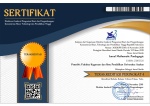PENINGKATAN PEMAHAMAN KONSEP MATEMATIS MELALUI PEMBELAJARAN KONTEKSTUAL PADA SISWA SEKOLAH MENENGAH PERTAMA
Abstract
This study aims to find out: whether an increase in understanding of mathematical concepts students who learn using contextual approaches is better than students who get conventional learning. This research is a quasi-experimental study. The population of this study was seventh grade students of junior high school. Sample selection is done by cluster random sampling technique. The instrument used is concept understanding tests. The instrument was stated to have fulfilled the requirements for content validity, and the reliability coefficient was 0.77. The data in this study were analyzed using descriptive statistical analysis and parametric statistical analysis. Statistical analysis was carried out by analysis of covariance (ANACOVA). The findings of this study are that there is an increase in the ability to understand mathematical concepts of students who use contextual learning better than students who use conventional learning. From the results of the study it is suggested: (1) Learning with a contextual approach is one alternative for mathematics teachers in presenting mathematics subject matter (2) to other researchers who can continue their research on other subjects and mathematical abilities using a contextual approach
Full Text:
PDFReferences
Ansari, B. I. (2009). Konsep dan Aplikasi Matematik. Banda Aceh: Yayasan PeNA Banda Aceh Divisi Penerbitan.
Darhim, (2003). Pengaruh Pembelajaran Matematika Kontekstual Terhadap Hasil Belajar Dan Sikap Siswa Sekolah Dasar Kelas Awal Dalam Matematika. Disertasi pada PPS UPI: Tidak Diterbitkan.
Rauf, S.A (2004). Pembelajaran Kontekstual dalam Upaya Meningkatkan Pemahaman Konsep dan Koneksi Matematik Siswa SLTP Negeri 1 Toli-Toli Sulawesi Tengah. Tesis pada PPS UPI Bandung: Tidak Diterbitkan
Tarmidi, R.D.S. (2006). Matkita: profil, (online), (www.matkita.com)
DOI: https://doi.org/10.36294/jmp.v3i2.422
Refbacks
- There are currently no refbacks.





